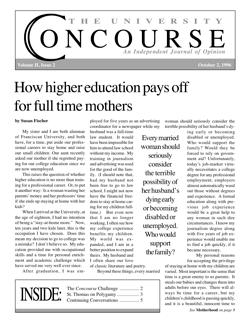Sports at Franciscan University
by Ivan Ortiz
In reading her article “Sports before studies,” I perceive that Ms. Bratten has unfortunately misdiagnosed the role of sports at Franciscan University, at least in part because of a bad experience with a few immature students. Although Ms. Bratten’s concern with the abuse of athletics is valid as it pertains to other schools, it does not apply to our University. Her claim that sports is the latest, “most insidious” threat to our academics is simply ludicrous.
Perhaps I can offer some more plausible insight as to the role of sports here at the University. Everyone who has ever lived has been created with a tripartite composition of mind, body and soul. We are given by God the free will to use the mind and the body in ways that are beneficial to the soul. God also confers on each person different gifts and talents, which enhance the abilities of any one of the three parts of the human being, if not all of them. One such gift is intelligence, which we at the University share—it was needed to gain admission to this institution. But God has also graced many students with athletic talent. For those included in this category, it is natural to desire something more than a basic workout, which would stimulate only the body. These people would rather apply their gifts of intelligence and athleticism in unison, partaking in competitions of strategy and skill which involve taking the body to its physical limits—a concise definition of the word “sport.” Is it just, then, to attack sports and athletes for sacrificing the use of the mind?
In the Book of Genesis it states that God rested on the Seventh Day. In following this example given to us by God, we must admit the necessity of rest. This need for rest is especially evident here at the University, because concentration on scholarly pursuits all day, every day is humanly impossible! But how do we rest? This question is left to be answered by the individual and his tastes. We all have our own preferences and forms of rest, some of which are simply destructive. Our University, being, as Ms. Bratten says, a “bastion of truth and a proponent of intellectual integrity” encourages us to find wholesome forms of rest which, rather than promoting physical, mental or spiritual sloth, carry the student away from the tension and rigors of the intellectual life, in order that he may re-enter it energized and motivated. Is it just, then, to attack sports as “insidious” and “least important” of all possible university activities?
Ms. Bratten’s statements concerning the conflicts occurring between the Honor’s Symposium and Ultimate Frisbee games are understandable. There is a certain amount of frustration felt when people shirk their responsibility for one thing to do something of equal or lesser importance. But, since the Honor’s Symposium, to my knowledge, is (like sports) an extracurricular activity, and is not required for anyone’s graduation—or, for that matter, education—it should take no higher importance than any other extracurricular activity, such as intramural sports. We all must, at some point in our lives, wrestle with the fact that not everyone values equally those subjective values which we value.
Neither the Athletic Department nor the sport of Ultimate Frisbee are to blame for deficient attendance at Honor’s Symposium meetings. Those students who were not mature enough to select one or the other time commitment, so that no one would be left “out on a limb,” are the only persons who are at fault. Is it just, then, to attack the general position of sports here at the University?
However, I must agree that there is a virus, a plague of sorts, that runs rampant in the athletic programs at many universities. It is a great injustice that students be allowed to receive scores they did not earn. To attack and stifle such abuses is both valid and obligatory. Ms. Bratten’s article would have had a stronger effect at schools such as these, where it would have been more relevant.
Ivan Ortiz, Senior, Humanities and Catholic Culture


